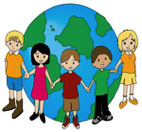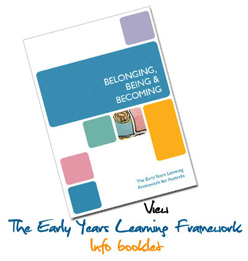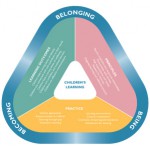Educational Curriculum Learning Through Play

Our developmental program that is implemented in each of the rooms, provides stimulating learning experiences that incorporate the Early Years Learning Framework (EYLF) and developmental areas. The program occurs throughout the day across both indoors and outdoors environments and incorporates real life experiences. Learning experiences occur on an ongoing basis, are spontaneous or planned and reflect learning assessment, interests, needs and evaluations. Our curriculum cycle records how the implementation of learning occurs and links one experience to the next.
Through active play children explore, learn and understand the world around them and make choices based on previous experiences and interests. With contributions from families, educators extend children’s interests and guide learning by introducing new concepts through intentional teaching. By providing opportunities to explore children will become successful and independent learners.
Technology will be incorporated into the learning as a tool to extent, explore and capture experiences. Children are inquisitive learners and with the use of technology will be able to connect to the wider community and world they live in.
Parental collaboration is valued and encouraged in all aspects of our curriculum as a partnership in learning with families provides the best outcomes for each child.
The Early Years Learning Framework Belonging, Being and Becoming
Australia’s first National “Early Years Learning Framework” (EYLF) for early childhood education was introduced in 2009. Fundamental to the framework is a view that children learn from 0-5 years and childhood is fundamentally characterised by belonging, being and becoming. The EYLF V 2.0 was update in 2023.
Belonging– From birth children are connected to family, community, culture and place. A sense of belonging is vital to all human existence. When children experience a sense of belonging it shapes who children are and who they become.
Being– Is the here and now. Children need time to just “be”, so they can make meaning of their world.
Becoming– As children participate in everyday life, they develop interest and construct their own identity and understanding of the world. Becoming is about the learning and development that occurs in early childhood. Children’s sense of identity emerges and they begin to be active participants in society.
The EYLF puts children’s leaning at the core and combines three inter-related elements: Principle, Practice and Learning Outcome. All three elements are fundamental to early childhood pedagogy and curriculum decision making.
Principles, Practices and Learning Outcomes- The Early Years Learning Framework has a structure provided by three key elements – Principles, Practices and Learning Outcomes. These help us to reflect about our work, to appropriately plan our programs for children and guide us on how we work with children, their families and our community.
Principles- relates to our beliefs and values. The Early Years Learning Framework provides us with Principles to guide us in our work with children and focuses on assisting each individual child to make progress towards the Learning Outcomes. The five principles are the following –
- Secure, respectful and reciprocal relationships
- Partnerships
- Respect for diversity
- Aboriginal and Torres Strait Islander persoectives
- Equity, inclusion and high expectation
- Sustainability
- Critical reflection and longing professional learning
- Collaborative leadership and teamwork
Practices- relates to how we put our Principles into action by working together with children, their families and within our community. The Early Years Learning Framework promotes children’s learning by drawing upon a repertoire of pedagogical practices (using our skills and knowledge that enable us to help children to learn) by
- Holistic, integrated and interconnected approaches

- Responsiveness to children
- Play-based learning and intentionality
- Learning environments
- Cultural responsiveness
- Continuity of learning and transitions
- Assessment and evaluation for learning, development and wellbeing
Learning Outcomes
Learning Outcomes encourages childcare professionals to track what children can do. Supports and guides individual learning programs for children. It provides reference points which can be used to identify a child’s progression. The Learning Outcomes are relevant to children of all ages (birth to five years) and acknowledges that each individual child learning progresses at their own rate. In the Early Years Learning Framework there are five Learning Outcomes and under each of the outcomes there are broad goals which provide key components of learning that may be observed in children as they learn.
The Outcomes are:
|
|
|
|
|


